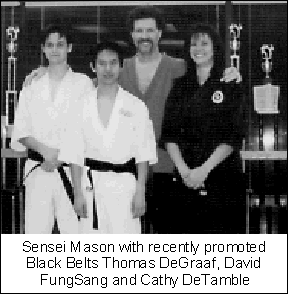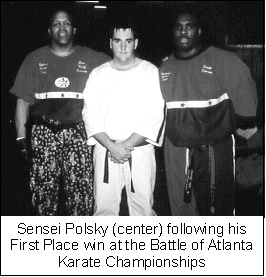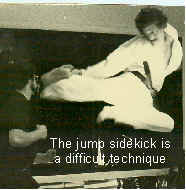The Value of Learning Real Skills:
And finishing what you start
It is accepted in our culture that the majority of children will attend school for thirteen years prior to graduation. Part of the purpose of educational programs is to prepare our youngsters to move into the adult world and be capable of earning a living, while contributing to the community in some appropriate capacity. At the karate school our curriculum is structured quite differently. Students move at their own pace through the belt levels from 9th kyu to 1st kyu, and then onto the Black Belt rank, Shodan (first degree Black Belt). In school students must wait a full year between each grade promotion, whereas it is not unusual for beginning karate students to be promoted three ranks during the first twelve months of their training. Once karate students reach the intermediate levels the time needed to attain the necessary skills naturally takes longer, and by the time students achieve Brown Belt it is common for them to train more than a year between promotions.

Despite the extra time necessary to scale the Brown Belt ranks and achieve the peak of Black Belt graduation, the martial arts program at University Karate Center can usually be accomplished by adults in three to six years and by children in five to ten years. This compares very favorably with the thirteen years required in the standard educational program from kindergarten to twelfth grade high school graduate. Our program also compares favorably in terms of the students’ ability to acquire important life lessons that can be applied to many aspects of adult life. While school programs try to achieve proficiency in language and communication skills, mathematics, science, and the social sciences, martial arts training focuses on other elements of personal growth. In particular our program requires that students develop an inner harmony between the physical, emotional, intellectual and psychological aspects of their being. Our goal in large part is to complement the academic studies at school with the acquisition of personal and interpersonal skills and an integrated sense of competence.
In an effort to improve education in both public and private schools, this year it seems that many schools have adopted the policy of “more is better” where homework is concerned. Some of our regular students have been “absent without leave” from regular classes here at the Dojo since regular school resumed, and the culprit, we are being told, is lots and lots of homework. Several parents have told us that their fourth graders, and in some cases second graders, are being given as much as two to three hours of homework per night. Since most people have limited amounts of free time in their schedule, the choices are narrowed for families who want to support their child in regular school and who also want to provide other activities, such as karate, as well.
Thus, many parents find themselves between the proverbial “rock and a hard place”, in a dilemma that is not easy to resolve. Obviously academics are important and have their place every child’s schedule; however, after spending all day in school one wonders if also spending all night on homework is such a good idea. Balance in life is so important; yet the hectic pace of life that most families lead makes it a tough squeeze to get everything done. If both parents work, as is so often the case nowadays, there is often little time left over for household chores, family time, and leisure time. Nonetheless, all work and no play is not good for youngsters either, so what is the answer?
Experts often recommend taking breaks while doing “mental work” (academic or paperwork) as time away from the task will often freshen the mind and help the individual to be more productive. Sometimes a healthy “distraction” can allow the mind to recover and the body to re-energize as well. Psychologists often mention the “body-mind” connection, stating that frequent and consistent physical exercise is very important to a child’s overall growth and development, which includes the ability to think clearly.
Many of our adult students who are in high stress
jobs find that an hour of training a few times a week can help them cope
better with other aspects of their life.
Not only is it fun and relaxing for them to “get away from it
all” for awhile; but the health benefits of martial arts training are a
boon to them too. Studies
have reported the ill effects of undue amounts of stress on our children
in this fast paced society, and so we find that children need to
“de-stress” from their day as well.
Training twice a week is a good maintenance schedule for students, adult, teen or child. The weekly schedule is available on our website at www.mudokai.com if you need to check it. We are open seven days a week (unlike other programs with more limited schedules) and we encourage our students to “mix and match” their karate class schedule, perhaps taking a class during the “school week” and an additional class on the weekend.
We look forward to seeing all of our valuable
students in class this autumn so that they can continue to enjoy the
benefits of consistent training in our MuDoKai (the unlimited way)
system of martial arts.
Yours truly,
![]()
Sensei Robert H. Mason
Chief Instructor

We are pleased to welcome back to the karate school two Black Belts, Sensei Charles Lewis, 4th Dan and Sensei Brian Polsky, 2nd Dan. Mr. Lewis was the Head Instructor here at the Karate school for many years. He was responsible for initiating the Weapons Program and helping to develop the “Funkicks” Fitness Kickboxing classes at our Dojo. He is featured in the “Funkicks on the Beach” home video workout with Funkicks founder Sensei Rodrigo Navarrete. Sensei Lewis is currently teaching the Funkicks class Thursday nights at 7:45 p.m.
Sensei Brian Polsky started training here at the karate school when he was eleven years old. He began competing in martial arts tournaments as a yellow belt and excelled at Weapons and Fighting competition. He is a former Florida State Champion and Battle of Atlanta Black Belt Champion.
Sensei Doug Powell, Sensei Chris Young and Sensei Bob DiRocco all stopped by at different times recently to visit the karate school.
Sempai of the Month
The Sempai of the Month is chosen on the basis of attitude, aptitude and overall helpfulness as it is demonstrated, toward the other students and to the instructor, while on duty as sempai of the class. Sempai Packets, which contain valuable info such as “How to be a Great Sempai” (Review Notes Sheet), When to Sempai and Sempai Requirements for each of the levels of Brown Belt and Black Belt (Info Sheet I), and when patches and gold stars are awarded, and “How to learn to be an Instructor” (Info Sheet II), may be picked up at the Front Desk.

The Sempai of the month for October is Vernon Slaughter. Vernon is a 1st kyu student and has been practicing Mudokai for six years. He mostly attends the morning classes with his wife Pat who is also a Brown Belt student.
Physically we seek to improve the student's balance, flexibility, coordination, fitness, agility and stamina. Emotionally we work with specific breathing techniques to encourage the development of emotional balance. This allows student’s to maintain their self-control even under difficult circumstances. Psychologically we work on improving perceptual skills, especially as they relate to timing and distancing, and cognitive skills which include the use of visualization as a learning tool. This training allows the mind to be stilled, so that the student can go from perception into action without the need for cognition, which would slow down the response time. Skills of this kind, while difficult for a non Martial Artist to comprehend, impart the reflexive speed and coordinated spontaneous movement that seems almost supernatural in execution.
Some time ago a parent had complained to me that our program took too many years to accomplish. She was unhappy that, despite her son having trained for about five years, he was probably still three years away from receiving his Black Belt. Part of the reason for her disquiet on this issue was the misperception that achieving Black Belt should be a lot quicker and easier than graduating high school. The reality is actually that the skills required to achieve Black Belt are generally more difficult to accomplish for most people than is a high school diploma. This is why, having taught in Plantation for twenty-two years and probably enrolled around ten thousand people in my programs at one time or another, I have only graduated seventy-one Black Belts. However, all students who train regularly, regardless of at what age they begin training, can probably achieve Black Belt in significantly less time than it takes to graduate high school. Whatever difficulties arise in the path towards achieving promotion can be overcome with practice. It is in the process of acquiring the skill necessary to triumph over the inner and outer obstacles that arise during training, that the real gains in character development are made that define the development of the “Black Belt attitude”. These qualities, to which students aspire as they strive for Black Belt, include courtesy , modesty, integrity, perseverance, courage, and the kind of indomitable spirit that can only be forged through a process that involves conscious work and intentional suffering.
Taken as a whole it seems to me that the time investment made by karate students young and old contributes in a very efficient manner to the development of essential real life skills that probably have to be experienced to be fully appreciated. I have been a martial artist for so long that I cannot imagine not having the skills I’ve acquired. To a certain extent perhaps I take them for granted, but I am often reminded by new students of how far I have come. Martial Arts may not seem to be a particularly intellectual pursuit; however, psychological research indicates that all intellectual growth begins on a sensory-motor level. I would be interested to hear from any students, regardless of their age, of ways they feel that karate training in Mudokai has made a positive impact on their life. I would like anyone who chooses to share their thoughts to turn in their efforts at the Front Desk by October 30th so that I can review them for inclusion in our December newsletter.
Sensei Robert H. Mason c2002